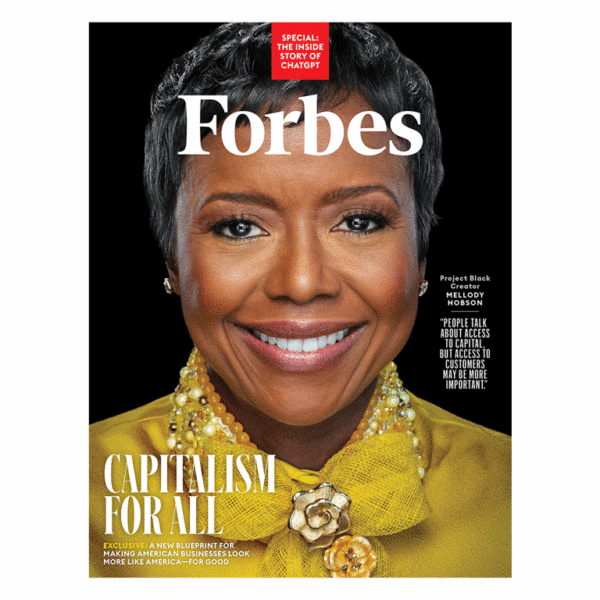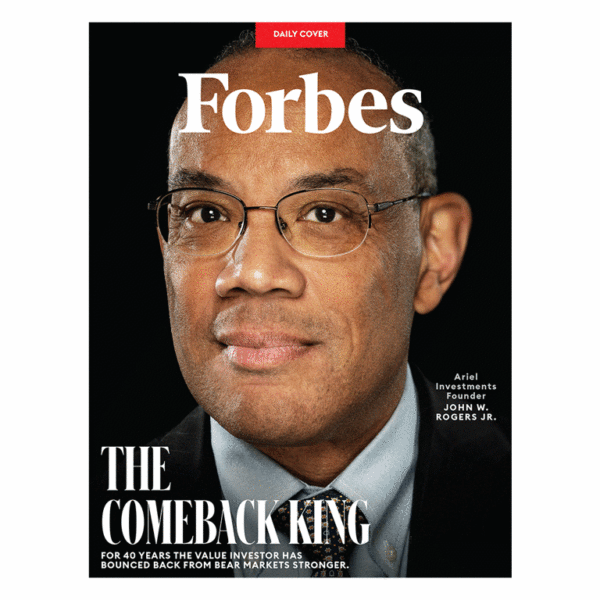MEMORANDUM
TO: Clients and Friends of Ariel Alternatives and Ariel Investments
FROM: Leslie A. Brun, Co-Founder, Chairman, & CEO, Ariel Alternatives
DATE: February 1, 2023
RE: Project Black Fund Closes
Today, Ariel Alternatives is pleased to announce our inaugural fund, Project Black, has closed with $1.45 billion in committed capital from limited partners and co-investors. Despite the fundraising challenges that arose from the bear market, we raised one of the largest private equity funds for a first-time manager in history—a statistic that is both humbling and energizing.
When Mellody Hobson and I launched this ambitious effort two years ago, she wrote, “the time is right for the formation of an investment firm that scales sustainable, minority-owned businesses by simultaneously solving for two critical factors: capital and customers.” With 95% of minority business enterprises (“MBEs”) having less than $5 million in revenues, the math told us that the need was great. This rang especially true in the context of Fortune 500 companies looking to diversify their vendor lists—literally and figuratively—following the pandemic’s supply chain shortages as well as the civil unrest triggered by the brutal murder of George Floyd. Not to mention, minority firms receive an average of just 2% of the corporate spend of the Fortune 500 today.*
First, JPMorgan Chase & Co. committed to co-invest. Then our path to this moment was fortified by a resolute group of institutions putting their money to work to address their supply chain diversity challenges while helping to elevate the Black and brown businesses our country needs to create a fair and equitable society. As we wrote last year, “Ours is a novel idea that has never been done before. We are attempting to magnify impact through financial success.” To this end, we are now happily—and gratefully—partnered with the following organizations as we seek to generate returns by scaling opportunity:
- AmerisourceBergen Corporation
- Amgen Inc.
- Ballmer Group
- Hobson/Lucas Family Foundation
- Lowe’s Companies, Inc.
- Merck & Co., Inc.
- NextEra Energy, Inc.
- Nuveen, the asset manager of TIAA
- Qatar Investment Authority
- Salesforce, Inc.
- Synchrony Financial**
- Truist Financial Corporation**
- Walmart Inc.
We recognize that a $100 million minimum investment drawn down over a multi-year period was an audacious ask, particularly in the context of a first-time fund. And yet, we know large commitments will help maintain the alignment of interests needed to navigate complex supply chain environments as well as to fund our purchase of 6-10 platform businesses with $100 million to $1 billion in revenues. Although our companies may not be minority enterprises upon acquisition, through Project Black’s ownership of at least 51% of the common equity and other deliberate actions, they will become certified minority business enterprises that can serve as Tier 1 suppliers to the Fortune 500.
Progress Through Profits
Our first acquisition was Sorenson, the leading U.S. communications provider for people who are Deaf and hard-of-hearing, at an enterprise value of $1.3 billion. Prior to our purchase last April, just 3% of Sorenson’s leadership team and board of directors were comprised of minorities. As we assumed control and actively sought to augment the organization with seasoned leaders including CEO Jorge Rodriguez, representation significantly increased. Minorities now make up 43% of the senior leadership and board. This top-down approach to diversifying the workforce is expected to create opportunities from the C-suite to the rank-and-file. In addition, a Chief Impact Officer was hired to hold the company accountable to our ESG goals.
One unique aspect of our investment process is to leverage our Chief Procurement Officer Council—a group of the country’s most influential corporate supply chain executives. They help drive our proprietary “demand aggregation process,” which assesses the ability of potential portfolio companies to meet the supply chain needs of the Fortune 500—including our investors. This practice was utilized during our due diligence of Sorenson.
The transaction was sourced and executed by our diverse, results-oriented, private equity leaders who are drawn to our bold mission. Together, along with our experienced board—whom we call our “accelerants”—we aim to change the narrative as we seek to narrow the wealth gap in this country. To do so, we stand on the shoulders of Ariel Investments’ 40-year history with our own actively patient approach to private equity.
Project Black was born from corporate promises made during a time of civil unrest and pandemic shortages. Despite its origins in tragedy, we believe Project Black points to a better future. We envision our partnerships with the world’s largest corporations having a vital and lasting impact—generating more jobs, more economic growth and more equality. As our journey begins, we can see the finish line—a society in which minority enterprises have the depth and breadth to compete in any arena and where, in success, everyone wins.
As always, we appreciate your consideration and welcome any questions or comments you might have.
*Source: CEO Action for Racial Equity
**Represents a co-investor in a vehicle structured to support Project Black and participate in investments while complying with certain regulatory requirements.
Click here to read our press release, which details more about our firm, investment strategy and portfolio management process.
Click here to read the just published Forbes monthly cover story featuring Mellody Hobson on today’s fund closing, and click here to read Forbes’ daily cover story on Ariel’s 40th anniversary, featuring Co-CEO John W. Rogers, Jr.


In this interview, John W. Rogers, Jr. candidly discusses his opinions on the market, different sectors, and individual companies that may have, at the time of the interview, been held in one or more of Ariel’s strategies. These opinions are current as of the date of this interview but are subject to change. The information provided in this interview does not provide information reasonably sufficient upon which to base an investment decision and should not be considered a recommendation to purchase or sell any particular security. This material should not be considered an offer for any of the securities referenced. The information contained in the interview is not guaranteed as to its accuracy or completeness. Portfolio holdings are subject to change. See the Products section of our website for current product holdings.
Ariel Fund is the longest-running fund in Morningstar and Lipper’s Mid-Cap Value categories. Lipper, Inc. and Morningstar, Inc. are nationally recognized organizations that report performance and calculate rankings for mutual funds.
This article includes a quote from Steve Ballmer, noting that he is a current investor in Project Black, L.P. Mr. Ballmer was not paid for this quote or any testimonial or endorsement. To Ariel’s best knowledge, Mr. Ballmer is not subject to any material conflicts of interest with respect to his investment in Project Black or in connection with the quote provided.
Performance data quoted specific to the Ariel Fund represents past performance. All performance assumes the reinvestment of dividends and capital gains, and represents returns of the Investor Class shares. The investment return and principal value of an investment will fluctuate so that an investor’s shares, when redeemed, may be worth more or less than their original cost. Current performance may be lower or higher than the performance data quoted. For the period ended December 31, 2022, the average annual total returns of the Ariel Fund for the one-, five- and ten-year periods were -18.82%, 4.62%, and 9.96%, respectively. The Ariel Fund Investor Class had an annual expense ratio of 1.00% for the year ended December 31, 2022.
Past performance does not guarantee future results. Investing in equity stocks is risky and subject to the volatility of the markets. The performance of any single portfolio holding is no indication of the performance of other portfolio holdings or its strategy. A growth investment strategy seeks stocks that are deemed to have above-average growth potential. Growth stocks offer an established track record and are perceived to be less risky than value stocks. A value investment strategy seeks undervalued stocks that show a strong potential for growth. The intrinsic value of the stocks in which a value strategy invests may be based on incorrect assumptions or estimations, may be affected by declining fundamentals or external forces, and may never be recognized by the broader market.
Investors should consider carefully the investment objectives, risks, and charges and expenses before investing. For a current summary prospectus or full prospectus which contains this and other information about the funds offered by Ariel Investment Trust, call us at 800-292-7435 or click here. Please read the summary prospectus of full prospectus carefully before investing. Distributed by Ariel Distributors, LLC, a wholly-owned subsidiary of Ariel Investments, LLC. Ariel Distributors, LLC is a member of the Securities Investor Protection Corporation.
Indexes are unmanaged. An investor cannot invest directly in an index.
The Russell 2500™ Value Index measures the performance of the small to mid-cap value segment of the U.S. equity universe. It includes those Russell 2500 companies with relatively lower price-to-book ratios, lower forecasted growth values and lower sales per share historical growth. Its inception date is July 1, 1995.
Russell® is a trademark of London Stock Exchange Group, which is the source and owner of the Russell Indexes’ trademarks, service marks and copyrights. Neither Russell nor its licensors accept any liability for any errors or omissions in the Russell Indexes or underlying data and no party may rely on any Russell Indexes and/or underlying data contained in this communication. No further distribution of Russell data is permitted without Russell’s express written consent. Russell does not promote, sponsor or endorse the content of this communication.
The S&P 500® Index is widely regarded as the best gauge of large-cap U.S. equities. It includes 500 leading companies and covers approximately 80% of available U.S. market capitalization. Its inception date is March 4, 1957.
